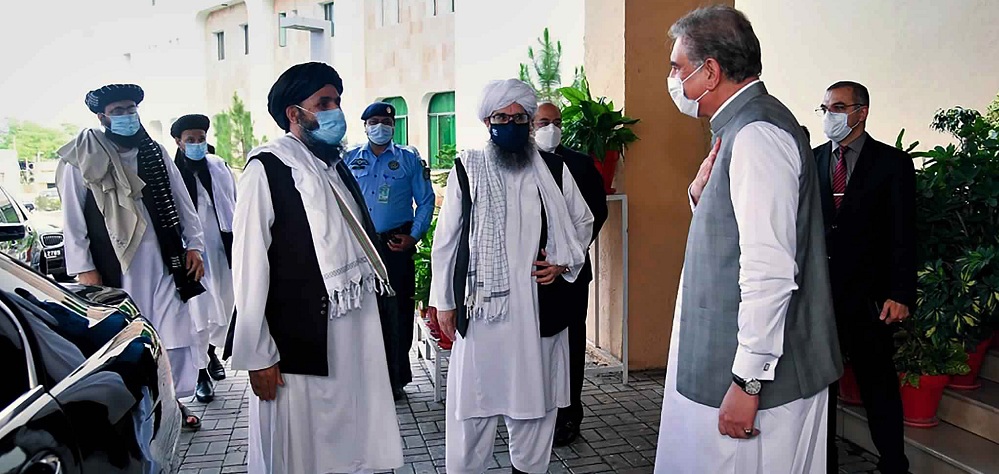AhlulBayt News Agency (ABNA): Afghanistan keeps to be at the center of the Central, and even West, Asian developments, with various actors struggling to set up new relations with the country under its new rulers. Indeed, with the withdrawal of US-led coalition forces from Afghanistan and the recapture of political power by the Taliban, countries in the region are modifying their approaches to respond to emerging scenarios. For nearby countries such as China, Russia, the Central Asian republics, India and Pakistan, the political, economic and security risks in Afghanistan remain high.
Afghanistan's eastern neighbor Pakistan, meanwhile, is preparing to address the political and security changes and whatever the future may bring in the country. Islamabad has undoubtedly played a major role in directing Afghanistan's new equations, the main outcome of which has been the re-emergence of the Taliban. Over the years, the Pakistani Inter-Services Intelligence (ISI) has played a key role in the insurgent group's continued struggle against the Western occupiers by covertly supporting the Taliban.
Pakistan also played a key role in the Taliban's negotiations with the US in Doha, beside the major role in the Taliban's re-control of Afghanistan over the past month. Pakistan reportedly has launched airstrikes to cover the operation, pieces of evidence show.
Here are some questions: What special goals does Islamabad pursue in Afghanistan? How far can the Islamabad honeymoon with Taliban-controlled Kabul go?
The goals behind entry to Afghanistan case
Relations between Afghanistan and Pakistan have been strained from the beginning, and Pakistan has long sought to exert influence in the neighboring country. For example, during the uprising of the Afghan people against the Red Army of Soviets, Pakistan supported some fighters, also called mujahideen. The golden age of its influence in Afghanistan was the era of the Taliban rule. What is clear is that from the Taliban negotiations with Kabul government in Doha to Pakistan full support to the Taliban takeover in early August, Islamabad has tried to keep its position in Afghanistan strong. But there are special goals driving the Pakistani meddling in Afghanistan home affairs.
Checking India and expanding influence across Central Asia: One of Pakistan's most important goals from intervening in Afghanistan is to curb Indian influence in Afghanistan. New Delhi and Islamabad have clashed over the past few decades over border disputes and control of the Kashmir region and influence in Central Asia. With the Taliban seizure of power, Islamabad is now trying to steer Afghanistan's foreign policy away from India and closer to Pakistan for easier access to Central Asia.
Durand Line: Another special aim for Pakistan in Afghanistan is settlement of the decades-old Durand Line issue. For decades, many Afghan governments have refused to accept Pakistan's sovereignty over the border. The 2,430-kilometer borderline separates western Pashtuns, based in Pakistan, and eastern Pashtuns, based in Afghanistan. In addition, Kashmir issue is important and strategic for Pakistan. Bangladesh's independence in 1971 made Islamabad anxious about "Pashtunistan." Since independence, Pakistan has been scene for rivalry among ethnic groups the Punjabis, Sindhis, Baluchis, and Pashtuns for power control. With Bangladesh experience, Pashtuns can walk the same path, especially that they have made pro-separation claims but each time we're quelled by Islamabad.
Maintaining the status quo using Taliban: The main focus of Pakistan's policy since independence has been security. Pakistan has always feared a change in the borders of the region and has sought to maintain status quo. Pursuing this policy, Pakistan kept supporting its pawns in various ways since the US invasion toppled Taliban rule.
Limits ahead of Pakistan future relations with Pakistan
Though the current conditions can be called the golden days and honeymoon of Pakistan-Taliban relations, Afghanistan home and foreign equations suggest that the two sides' ties will possibly run into troubles in the future. Three issues feed the Pakistani concerns: First, recently Taliban freed Pole Charkhi prisoners in Kabul including a senior Tahreek-e-Taliban, a Pakistan-based anti-Islamabad militia, Malawi Faghir Mohammad. Second, the Taliban are discontented with Pakistan fencing the border with Afghanistan. Third, the Afghan Taliban tell Islamabad that the Tahreek-e-Taliban issue should be solved by Pakistani not Afghanistan. Pakistan has long been complaining that the Tahreek-e-Taliban militants and commanders are offered safe haven in Afghanistan.
In fact, the Taliban have fresh power today. The group has emerged as the dominant political force in Afghanistan and is ready to take over the government. Direct Washington negotiations with the Taliban, leading to the withdrawal of the US and the surprising and rapid fall of Kabul, have strengthened the Taliban's image as a victor in the war against a superpower. In addition, the world powers, the European countries, and the world in general have come to the understanding that the Taliban are a political reality in Afghanistan. Actually, their power, both at home and abroad, is now bigger than the last time they were in power, and that Pakistan is not their only foreign advocate.
Pakistan still cannot use its pressure lever in Durand Line case, which is one of the top security concerns of Islamabad. Border management remains a contentious issue due to Afghanistan's refusal to recognize the Durand Line. Questioning the disputed borderline is one of the rare issues that unites all Afghan political factions. Despite the fact that Pakistan has completed unilateral fencing of the border 90 percent, it needs to press Afghanistan to activate border patrols. This is while attacks against Pakistani forces along the border have continued, even after Kabul fell to the Taliban.
/129

